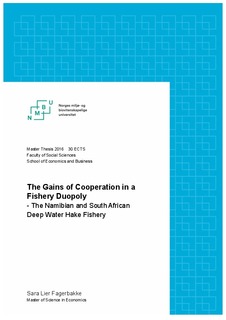| dc.description.abstract | This study evaluates the potential gains of cooperation between South Africa and Namibia in the resource management of the valuable transboundary deep-water hake fish stock. By combining the game strategic Cournot model with the Gordon Schaefer bio-economic model, we develop a static model used to investigate strategic decisions in the duopoly when the countries 1) manage the stock as shared and act interdependently when maximising their profits within their Exclusive Economic Zone (a Cournot duopoly), and 2) act in terms of regional cooperation with joint management (Sole Owner harvesting). These equilibriums are compared with Open Access regulation and the alternative Stackelberg duopoly. Moreover, we examine the effects of changes in costs or catchability on the equilibrium solutions of efforts, harvest, stock and profits. The theoretical model is applied to the Benguela-fishery by calibrating a numerical model based on observed values of the historic stock abundance and harvest, and availiable observations of costs and efforts in the period 2007-2015. Main assumptions are symmetry in fleets and a uniformly distributed fish stock. First, in assuming that we are initially in steady state, we investigate equilibrium changes when moving from a current scenario to Cournot, followed by a move from Cournot to Sole Owner. Equilibrium effects of an increase in costs and catchability are studied, and the Stackelberg duopoly is dicsussed. Finally, the asymmetric Cournot is further explored by looking at equilibrium effects when countries differ in costs and catchability. The numerical findings suggest that there are potential gains of cooperation both in terms of 1) cooperation in stock research and managing the stock as shared (Cournot), and 2) active regional management (Sole Owner), when using pre-exploitation levels of the carrying capacity of the stock. | nb_NO |
